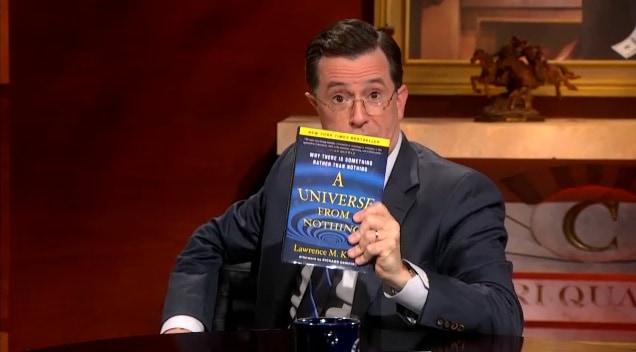I’m spending the summer in Canada, and while our neighbors to the north have been most hospitable, one of the things I’ve missed is easy access via Hulu to The Daily Show and The Colbert Report. I’m a bit late on this, but hear me out.
A few weeks ago Stephen Colbert interviewed Lawrence Krauss, a cosmologist and the author of A Universe from Nothing: Why There Is Something Rather than Nothing; in the book, Krauss argues that quantum mechanics can explain how something comes from nothing, thus saving us from the need for God. Colbert took him to task. Here’s the video:
| The Colbert Report | Mon – Thurs 11:30pm / 10:30c | |||
| Lawrence Krauss | ||||
|
||||
“Nothing” is one of our favorite topics here at TJP, and we’ve made something out of nothing twice before (here and here). I’m going in for the hat trick, and to offer Mr. Colbert a philosophical assist as well. In the interview, Colbert has a good go at Krauss — but he fell short of asking the killer question two separate times.
At two minutes in, Krauss describes the empty universe as a “boiling, bubbling sea of virtual particles,” and Colbert interrupts to point out “That’s not nothing! … Why are those virtual particles there?” Point for Colbert! Unfortunately, he lets Krauss wriggle off the hook with the answer: “Because of the laws of quantum mechanics.”
At four minutes in, Colbert goes on the offensive again, pointing out that this empty space may be empty to us, but maybe there’s some other, deeper reality that’s not apparent. But Krauss cuts him off to explain how the laws of quantum mechanics mean even space and time can arise from nothing.
Here’s the question Colbert should have asked: Why are there laws of quantum mechanics? Where do they come from? Why are they something rather than nothing? And why are they the kinds of laws they are?
(By the way, Colbert Report, you’ve already got James Martin, SJ as your chaplain. If you want a Jesuit philosopher on call, we’ve got a few we could introduce you to.)
But let’s give praise where praise is due: Colbert does have some great lines in this interview, and as unsatisfying as I find his theory, Krauss sports some awesome orange shoes. More seriously, Colbert points out that all Krauss has done is replace a more-or-less opaque religious explanation with an appeal to a different, scientific priesthood, where only the initiates know what’s really going on and everybody else must take their explanation on faith.
Finally, Colbert’s last joke makes the point that arguments for the existence of God have always made: God’s the point at which explanations begin, not just where they break down. Or as Colbert puts it in Krauss’s terms: “If God is nothing, can’t something come from him?”
For Further Reading:
- If you’d like to read more about how “why questions” work, TJP’s own Matthew Dunch has that covered (and as a bonus, tackles Krauss’s argument in passing); more recently, Ryan Duns took this up in his second “How to Be an Atheist” post, on creation ex nihilo.
- David Albert has a much more thorough takedown of Krauss’s argument in his review of the book in the New York Times.
- And in an interview in The Atlantic, Ross Andersen presses Krauss on the “why are there laws” front; to his credit, Krauss has at least thought deeply about this, but unfortunately, as Matthew Dunch pointed out in the article linked above, he’s happy with a less-than-explanatory answer to the problem.


